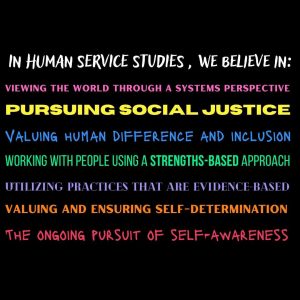- Home
- Academics
- Arts & Sciences
- Human Service Studies
- About Our Department
About Our Department
Human Service Studies: The Art and Science of Helping
 Human Service Studies teaches students how to meet human needs through evidence-based best practices and building relationships, and uphold a commitment to improving the overall quality of life for all people.
Human Service Studies teaches students how to meet human needs through evidence-based best practices and building relationships, and uphold a commitment to improving the overall quality of life for all people.
Based on core values of social justice and equity, human service professionals work with individuals and communities addressing both personal and societal issues. Human service professionals are case managers, counselors, advocates, organizers, and policy makers working in mental health, children’s services, family services, criminal justice, health care, community development and any area of need facing our community’s last, lost, littlest, and least.
Course of Study
Human Service Studies mission and the curriculum designed to accomplish it are based on a set of Core Principles that guide our actions and are infused throughout our courses.
These principles are:
- Viewing the world through a Systems Perspective
- Valuing Human Difference and Inclusion
- Pursuing Social Justice
- Working with people utilizing a Strength’s-based approach
- Utilizing practices that are Evidence-based
- Valuing and ensuring Self-determination
- The on-going pursuit of Self-Awareness
HSS majors build skill competency by taking courses that teach theory and foundational knowledge, interventions and skills, and provide opportunities to apply that knowledge to practice in professional settings.
- Foundational and skill-building courses include Counseling Individuals and Families, Working with Groups and Communities, Designing and Evaluating Human Service Programs, Inequality and Social Policy, Research Methods and Advanced Interventions.
- Students choose specialized electives that focus on populations or areas of study such as Juvenile Justice, Play Therapy Health Social Work, International Human Services, Eating Disorders, Deaf Culture and ASL, and Aging.
- Practice courses, Service-Learning, Practicum and Internship, give students the chance to apply their skills and knowledge to real-world situations. Field education is always linked to courses where students learn foundational and practice knowledge, process their practice experience with other students, and are closely supervised by a faculty member. All majors complete at least 40 service-learning hours, a 100 hour practicum, and a 300 hour internship in various local, national and international settings chosen to fit their individual goals.
Research Opportunities
HSS majors have many opportunities to conduct original research with a faculty mentor. They present their findings at academic forums on campus and at professional conferences. Elon students have presented on topics such as human trafficking, play therapy, child abuse prevention, foster care, food justice and community gardens. Some HSS majors participate in one of Elon’s competitive Fellows programs.
After Graduation
HSS majors graduate fully prepared to begin careers in the profession or to pursue graduate study. Elon’s HSS majors attend graduate programs in social work, counseling, public health, law, and other areas. They have been accepted to many of the nation’s premier institutions, including:
- Columbia University
- University of North Carolina at Chapel Hill
- Wake Forest University
- University of Chicago
- Washington University in St. Louis
- University of Maryland
- University of Georgia
- Vanderbilt University
- University of Dublin
- University of North Carolina at Charlotte
- Boston College
- Appalachian State University
- University of North Texas
- Rutgers University
- Penn State
- Villanova University
- Simmons College
- University of Denver
“My majors were Human Service Studies and Spanish, and I just moved to Charlotte to begin working as a youth support partner for Thompson Child and Family Focus. My job is to be an advocate for youth going through different social service systems (mental health, foster care, etc.). I help them identify their strengths so they can move forward and use these strengths to heal and become the best versions of themselves.
Going into the workforce has been scary and stressful, but thanks to the wonderful HSS department at Elon I have never felt more prepared for anything. The professors and program as a whole have helped me develop the necessary skills and perspectives to best serve my community.”
Gabby Staub ’22 (she/her)